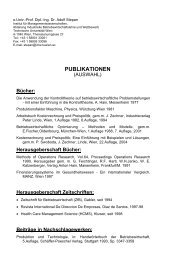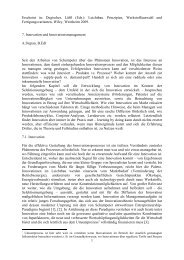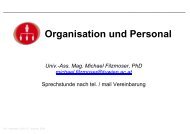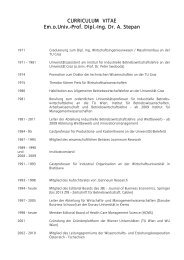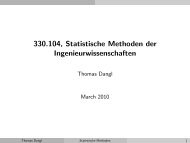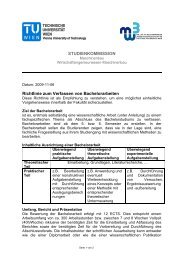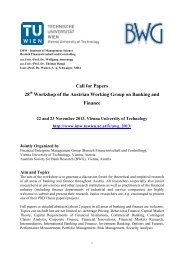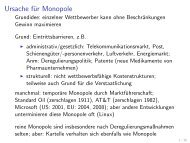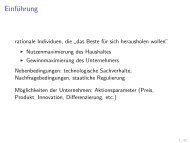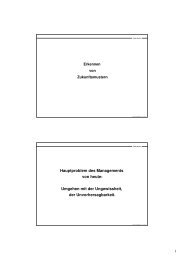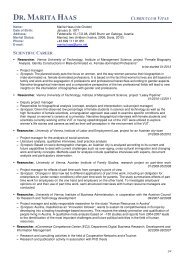Curriculum Vitae - IMW
Curriculum Vitae - IMW
Curriculum Vitae - IMW
You also want an ePaper? Increase the reach of your titles
YUMPU automatically turns print PDFs into web optimized ePapers that Google loves.
CURRICULUM<br />
VITAE<br />
September 2012 Univ.Prof. Mag. Dr. Sabine Köszegi<br />
Professor of Labor Science and Organization<br />
Department of Management Science<br />
Vienna University of Technology<br />
Theresianumgasse 27<br />
A-1040 Vienna<br />
p: +43 1 5880133071<br />
f: +43 1 5880133092<br />
e: sabine.koeszegi@tuwien.ac.at
<strong>Curriculum</strong> <strong>Vitae</strong><br />
PERSONAL<br />
INFORMATION<br />
Date and Place of birth<br />
Citizenship<br />
EDUCATION<br />
02/1997 - 12/2000<br />
08/1992 – 12/1992<br />
09/1989 - 12/1994<br />
09/1984 - 05/1989<br />
09/1980 - 06/1984<br />
09/1976 - 06/1980<br />
ACADEMIC<br />
CAREER<br />
08/2012 – 08/2013<br />
Since 09/2011<br />
02/2010<br />
Since 04/2009<br />
Since 04/2009<br />
Since 01/2009<br />
08/2007 – 12/2008<br />
10/2006 – 12/2008<br />
July 2006<br />
02/1997 – 09/2006<br />
June 3 rd 1970, Wegscheid, Germany<br />
Austria<br />
<strong>Curriculum</strong> <strong>Vitae</strong> Sabine Theresia Köszegi<br />
Doctorate “Sozial- und Wirtschaftswissenschaften” at the School of<br />
Business, Economics, and Computer Science University of Vienna,<br />
Dissertation: Trust in Virtual Organizations<br />
Exchange Program: Business Administration, University of Illinois at<br />
Urbana/Champaign, USA<br />
Bachelor & Master in Business Administration at the Vienna University of<br />
Economics and Business Administration<br />
Thesis: Arbeitszufriedenheit aus systemischer Perspektive<br />
Bundeshandelsakademie Rohrbach (Matura)<br />
Bundesrealgymnasium Rohrbach<br />
Elementary School Altenfelden<br />
Maternity Leave<br />
Member of the Senate of Vienna University of Technology<br />
Appointment (Ruf) as a Full Professor at the Faculty of Social Sciences,<br />
Economics & Business at the Johannes of Kepler University Linz,<br />
appointment rejected (Ruf abgelehnt)<br />
Academic Director of the Professional MBA Entrepreneurship & Innovation<br />
(Vienna University of Technology & Vienna University of Economics and<br />
Business Administration (http://cec.tuwien.ac.at)<br />
Director of the Entrepreneurship Center Vienna (http://www.ecvienna.at)<br />
Full Professor of Labor Science and Organization at the Institute of<br />
Management Science, Vienna University of Technology<br />
Maternity Leave<br />
Associate Professor at the School of Business, Economics, and Statistics,<br />
University of Vienna<br />
Venia Docendi for Business Administration of the University of Vienna<br />
Assistant Professor at the School of Business, Economics, and Statistics,<br />
University of Vienna<br />
Page 2 of 21
PROFESSIONAL<br />
CAREER<br />
09/1996 - 01/1997<br />
05/1994 - 08/1996<br />
INTERNATIONAL<br />
VISITING<br />
POSITIONS<br />
01/2012 – 03/2012<br />
12/ 2006<br />
09/2005 – 12/2005<br />
09/2003 – 12/2003<br />
06/2002 – 08/2002<br />
PRICES<br />
& AWARDS<br />
2010<br />
2007<br />
2001<br />
2001<br />
1994<br />
<strong>Curriculum</strong> <strong>Vitae</strong> Sabine Theresia Köszegi<br />
Andersen Consulting Austria: Organizational Change Management<br />
KSB-Consulting, Bank Austria: Organizational Development and Change<br />
Management<br />
Guest Researcher at the Victoria University in Melbourne, Australia<br />
Guest Researcher at the National Sun Yat-sen University, Taiwan<br />
Guest Researcher at the Max Planck Institute for the Study of Societies in<br />
Cologne, Germany.<br />
Visiting Professor at the University of Ottawa, Canada.<br />
Guest Researcher (YSSP) at the International Institute for Applied System<br />
Analysis (IIASA) in Laxenburg, Austria<br />
Award for Innovative Teaching of Vienna University of Technology<br />
Best Paper award of the EURO/INFORMS Section on Group Decision and<br />
Negotiation, Annual Meeting in Mt. Tremblant, Canada<br />
Award for Innovative Teaching of the University of Vienna (awarded by<br />
Vizerektor für Lehre)<br />
Silbermayr-Price of the University of Vienna for the dissertation „Trust in<br />
Virtual Organizations“<br />
Ranking No.4, best graduates of the Economic University of Vienna<br />
Page 3 of 21
Publications and Research Reports<br />
UNIV.PROF. DR. SABINE KÖSZEGI<br />
REFEREED JOURNALS<br />
<strong>Curriculum</strong> <strong>Vitae</strong> Sabine Theresia Köszegi<br />
1. Koeszegi, S.T., Zedlacher, E., Hudribusch R. (2012): The War against the female Soldier? - The<br />
Effects of Masculine culture on workplace aggression. Accepted for Publication in Armed Forces<br />
and Society, forthcoming.<br />
2. Gettinger, J.; Koeszegi, S.T. (2012): Far from Eye far from Heart: Analysis of Graphical Decision<br />
Aids in Electronic Negotiation Support. Accepted for Publication in Group Decision and<br />
Negotiation, forthcoming.<br />
3. Graf, A.; Koeszegi, S. T.; Pesendorfer, E. (2012): Cross-Cultural Negotiations and Power Distance:<br />
Strategies Applied by Asian and European Buyers and Sellers in Electronic Negotiations. Nankai<br />
Business Review International, 3 (3), pp. 242-256 (doi: 10.1108/20408741211264567)<br />
4. Graf, A.; Koeszegi, S.T.; Pesendorfer, E.; Gettinger, J. (2012): Self-fulfilling Prophecy in e-<br />
Negotiations - Myth or Reality? International Journal of Decision Support System Technology 4<br />
(2), pp. 1-16 (doi: 10.4018/jdsst.2012040101).<br />
5. Gettinger, J., Koeszegi, S.T., and Schoop, M. (2012): Shall we dance? The Effect of Negotiation<br />
Graphs on Negotiation Processes and Outcomes. Decision Support Systems, 53, pp. 161-174<br />
(doi: 10.1016/jdss.2012.01.001)<br />
6. Kovacic, I., Filzmoser, M., Faatz, S., and Koeszegi, S.T. (2011): Research Project Cost Benefits of<br />
Integrated Planning: First Experiment-results, Organization, Technology and Management in<br />
Construction, 3 (1), pp. 254-263.<br />
7. Griessmair, M., Strunk, G., Vetschera, R., and Koeszegi, S.T. (2011): Complexity in Electronic<br />
Negotiation Support Systems – An Empirical Study, Nonlinear Dynamics, Psychology, and Life<br />
Sciences, 15 (4), pp. 477-511.<br />
8. Koeszegi, S. T., Pesendorfer, E.-M., and Vetschera, R. (2011): Data-driven Phase Analysis of Enegotiations:<br />
An Exemplary Study of Synchronous and Asynchronous Negotiations, Group Decision<br />
and Negotiation, Vol. 20 (4), pp. 385-410 (doi: 10.1007/s10726-008-9115-0)<br />
9. Graf, A., Koeszegi, S. T., and Pesendorfer, E.-M. (2010): Intercultural Negotiations in Interfirm<br />
Relationships: An International Study of Electronic Negotiation Behavior, Journal of Managerial<br />
Psychology, 25 (5); pp. 495 - 517.<br />
10. Griessmair, M. and Koeszegi, S. T. (2009): Exploring the Cognitive-Emotional Fugue in Electronic<br />
Negotiations, Group Decision and Negotiation, Vol. 18 (3), pp.213-234.<br />
11. Pesendorfer, E.-M., Graf, A., and Koeszegi, S. T. (2007): Relationship in Electronic Negotiations:<br />
Tracking Negotiator Behavior Over Time, Zeitschrift für Betriebswirtschaft, 77 (12), pp. 1315-<br />
1338.<br />
12. Haas, M., Koeszegi, S. T., and Nöster, M. (2007): Current Practice and Structural Patterns in<br />
Virtual Organizations – A Qualitative Analysis of 30 Cases, electronic Journal of Organizational<br />
Virtualness (eJOV), Vol.8, ISSN: 1442-9331, accessible through www.ejov.org.<br />
13. Nastase, V., Koeszegi, S. T., and Szpakovicz, S. (2007): Content Analysis through the Machine<br />
Page 4 of 21
Learning Mill, Group Decision and Negotiation, Vol. 16 (4), pp. 335-346.<br />
<strong>Curriculum</strong> <strong>Vitae</strong> Sabine Theresia Köszegi<br />
14. Pesendorfer, E.-M. and Koeszegi, S. T. (2007): Social Embeddedness in Electronic Negotiations,<br />
Group Decision and Negotiation, Vol 16 (4), pp. 399-415.<br />
15. Srnka, K. J. and Koeszegi, S. T. (2007): From Words to Numbers - How to Transform Rich<br />
Qualitative Data into Meaningful Quantitative Results: Guidelines and Exemplary Study,<br />
Schmalenbach’s Business Review, Vol. 59 of zfbf, pp. 29-57, and<br />
Auer-Srnka, Katharina J. and Koeszegi, Sabine T. (2009): Erratum on "From Words to Numbers"<br />
published in SBR 59 (January), in: Schmalenbach Busines Review, Vol. 61 (January), pp. 112-113.<br />
16. Koeszegi, S. T., Pesendorfer, E.-M., and Stolz, S. W. (2006): Gender Salience in Electronic<br />
Negotiations, Electronic Markets – the International Journal EM, Vol. 16 (3), pp. 173 - 185.<br />
17. Koeszegi, S. T., Srnka, K. J., and Pesendorfer, E.-M. (2006): Electronic Negotiations – A<br />
Comparison of Different Support Systems, Die Betriebswirtschaft, Vol. 66 (4), pp. 441-463.<br />
18. Pesendorfer, E.-M. and Koeszegi, S. T. (2006): Hot versus Cool Behavioral Styles in Electronic<br />
Negotiations: The Impact of Communication Mode, Group Decision and Negotiation, Vol. 15 (2),<br />
pp. 141-155.<br />
19. Srnka, K. J., Ebster, C. and Koeszegi, S. T. (2006): Lässt sich Sympathie im persönlichen Verkauf<br />
vortäuschen? Eine Analyse nonverbaler und verbaler Kommunikation, Marketing ZFP, Vol. 28 (1),<br />
pp. 39-58.<br />
20. Vetschera, Rudolf, Kersten, Gregory E., and Koeszegi, Sabine T. (2006): User Assessment of<br />
Internet-based Negotiation Support Systems. JOCEC - Journal of Organizational Computing and<br />
Electronic Commerce, Vol. 16 (2), 123-148.<br />
21. Koeszegi, S. T., Vetschera, R., and Kersten, G. E. (2004): National Cultural Differences in the Use<br />
and Perception of Internet-based NSS - Does high or low context matter? International<br />
Negotiation, Vol. 9 (1), pp. 79 - 109.<br />
22. Koeszegi, S. T. (2004): Trust Building Strategies in Inter-organizational Negotiations. Journal of<br />
Managerial Psychology, Vol. 19 (6), pp.640-660.<br />
Reprinted in: Reddy, Sumati (Ed.) (2005): International Negotiation: Perspectives and Challenges,<br />
ICFAI University Press, Hyderabad, pp. 37-66.<br />
23. Koeszegi, S. T. and Kersten, G. E. (2003): On-line/Off-line: Joint Negotiation Teaching in<br />
Montreal and Vienna. Group Decision and Negotiation, Vol. 12 (4), pp. 337 – 345.<br />
24. Kersten, G. E., Koeszegi, S. T., and Vetschera, R. (2003): The Effects of Culture in Computermediated<br />
Negotiations. JITTA – Journal of Information Technology Theory and Application, Vol. 5<br />
(2), pp. 1 - 28.<br />
25. Bauer, R and Koeszegi, S. T. (2003): Measuring the Degree of Virtualization. Electronic Journal of<br />
Organizational Virtualness, Vol. 5 (2), pp. 26 - 46.<br />
Page 5 of 21
EDITORSHIPS AND BOOKS<br />
<strong>Curriculum</strong> <strong>Vitae</strong> Sabine Theresia Köszegi<br />
26. Koeszegi, S. T. and Vetschera, R. (Eds.) (2007): Frontiers in Group Decision and Negotiation<br />
Research, Special Issue, Group Decision and Negotiation, Vol. 16 (4), 283-285.<br />
27. Köszegi, S. T. (2001): Vertrauen in Virtuellen Unternehmen. Wiesbaden: Dt. Universitätsverlag,<br />
Gabler, Edition Wissenschaft (Dissertation).<br />
BOOK CHAPTERS (REFEREED)<br />
28. Gettinger, J., Dannenmann, A., Druckman, D., Filzmoser, M., Mitterhofer, R., Reiser, A., Schoop, M.,<br />
Vetschera R., v.d. Wijst, P., Koeszegi, S. T. (2012): Impact of and Interaction between Behavioral<br />
and Economic Decision Support in Electronic Negotiations, in: Hernandez, Jorge (Editor):<br />
Collaboration in Real Environments, EWG-DSS Lecture Notes in Business Information Processing<br />
(LNBIP), Springer, pp. forthcoming.<br />
29. Koeszegi, S.T., Vetschera, R. (2010): Language and Process, in: Kilgour, M. & Eden, C. (Eds):<br />
Handbook on Group Decision and Negotiation, pp. 121 - 138.<br />
30. Koeszegi, S. T. (2009): Take the Risk and Trust? - The Strategic Role of Trust in Negotiations, in:<br />
Avenhaus, R., Sjoestedt G. (Eds.): Negotiated Risks: International Talks on Hazardous Issues,<br />
Springer, Berlin, pp. 65-86.<br />
31. Gruenbacher, P., Koeszegi, S. T., and Biffl, S. (2006): Stakeholder Value Proposition Elicitation<br />
and Reconciliation, in: Biffl, Stefan, Gruenbacher, Paul et al. (Eds.): Value-Based Software<br />
Engineering, Springer, Berlin Heidelberg New York, pp. 133-154.<br />
32. Koeszegi, S. T. and Vetschera, R. (2005): Electronic Commerce, in: Beckert, J., Zafirovski, M. (Eds.):<br />
International Encyclopedia of Economic Sociology. Routledge, London, pp. 229-231.<br />
33. Koeszegi, S. T. (2002): Vertrauen und Risiko in Virtuellen Organisationen, in: Scholz, Christian<br />
(Hrsg.): Systemdenken und Virtualisierung. Duncker & Humbolt, Berlin; p. 109-124.<br />
Page 6 of 21
CONFERENCES & PROCEEDINGS (REFEREED)<br />
<strong>Curriculum</strong> <strong>Vitae</strong> Sabine Theresia Köszegi<br />
34. Günther, E., Keinert-Kisin C, Zedlacher, E., Koeszegi, S.T. (2012) Couldn’t Resist? How to Balance<br />
Role-Conflicts in an Intra-organizational Gender Research Project. Proceedings of the 8th<br />
European Feminist Research Conference 2012, May 17-20, Budapest, Hungary.<br />
35. Günther, E. and Koeszegi, S.T. (2012): The Whole is More than the Sum of its Parts: A Qualitative-<br />
Quantitative Multi-level Approach to Intersectional Analysis of Student Drop-out. Proceedings of<br />
the 8th European Feminist Research Conference 2012, May 17-20, Budapest, Hungary.<br />
36. Günther, Elisabeth and Koeszegi, Sabine T. (2012): ‘How to grasp intersectionally? A qualitativequantitative<br />
multi-level approach to intersectional analysis of university dropout’. Proceedings of<br />
the 7th Biennial International Interdisciplinary Conference of Gender, Work and Organization<br />
2012, 27th -29th June 2012, Keele University, Staffordshire, UK.<br />
37. Keinert-Kisin, C., Hatzinger, R., and Koeszegi, S.T. (2012): Seeing something that isn’t there:<br />
Gender bias in the evaluation of junior talent in science and technology, Proceedings of the 7th<br />
Biennial International Interdisciplinary Conference of Gender, Work and Organization 2012, 27th<br />
-29th June 2012, Keele University, Staffordshire, UK.<br />
38. Keinert-Kisin, C., Hatzinger, R., and Koeszegi, S.T. (2012): What's in a name? A personnel selection<br />
experiment on gender bias in applicant assessment, Proceedings of the 28th European Group of<br />
Organization Studies Colloquium in Helsinki, Finland, July 5-7 1012.<br />
39. Druckman, D., Filzmoser, M., Gettinger, JH., Koeszegi, S.T., and Vetschera, R. (2012): 2.02 G<br />
eNerationS – Avenues for the Next Generation of Pro-active Negotiation Support, Proceedings of<br />
the International Conference on Group Decision and Negotiation in May 20 - 24, 2012, Recife,<br />
Brazil.<br />
40. Schoop, M., Gettinger, J., Koeszegi, S.T., van Amselsvoort, M., and van der Wijst, P. (2012):<br />
Communication and Decisions in Electronic Negotiations, Proceedings of the International<br />
Conference on Group Decision and Negotiation in May 20 - 24, 2012, Recife, Brazil.<br />
41. Dannenmann, A., Fernandes, M., Filzmoser, M., Gettinger, J., Koeszegi, S.T., Mitterhofer, R., Reiser,<br />
A., Schoop, M., and Vetschera, R. (2012): Integrating the AC-AT Concept into an Electronic<br />
Negotiation Support System: Implementation and Challenges, Proceedings of the International<br />
Conference on Group Decision and Negotiation in May 20 - 24, 2012, Recife, Brazil.<br />
42. Mitterhofer, R., Druckman, D., Filzmoser, M., Gettinger, J., Schoop, M., and Koeszegi, S.T. (2012):<br />
Integration of Behavioral and Analytic Decision Support in Electronic Negotiations; in: Sprague,<br />
R.H. Jr. (Ed.): Proceedings of the 45th Annual Hawaii International Conference on System Sciences,<br />
4-7 January 2012, Maui Hawaii, IEEE Computer Society Press, Los Alamitos California (DOI<br />
10.1109/HICSS.2012.334), pp. 610-617.<br />
43. Dannenmann, A., Druckman, D., Filzmoser, M., Gettinger, J., Koeszegi, S.T., Mitterhofer, M., Reiser,<br />
A., Schoop, M., van der Wijst, P., and Vetschera, R. (2011): Impact of and Interaction Between<br />
Behavioural and Economic Decision Support in Electronic Negotiations; in: F. Dargam, B. Delibasic,<br />
J. Hernandez, S. Liu, R. Ribeiro, P. Zarate (Eds.): Proceedings of the EWG-DSS London-2011<br />
Workshop on Decision Systems", pp. 6-7.<br />
44. Druckman, D. Filzmoser, M. Koeszegi, S.T., and Mitterhofer, M. (2011): e-Mediation in e-<br />
Negotiation: Support Philosphies and Tools"; in: F. Dargam, B. Delibasic, J. Hernandez, S. Liu, R.<br />
Ribeiro, P. Zarate (Eds.): Proceedings of the EWG-DSS London-2011 Workshop on Decision<br />
Systems", pp. 10-11.<br />
Page 7 of 21
<strong>Curriculum</strong> <strong>Vitae</strong> Sabine Theresia Köszegi<br />
45. Haas, M., Keinert, C., Koeszegi, S.T., Zedlacher, E. (2011): New Wine in old Wineskins New<br />
career boundaries for women in old networks in academia, Proceedings of the 27th EGOS<br />
Colloquium 'Reassembling Organizations' in Gothenburg, Sweden, July 7-9.<br />
46. Günther, E., Koeszegi, S.T. (2011): Gender Counts?! - Analysis of Student Dropout at Vienna<br />
University of Technology, Gender and Interdisciplinary Education for Engineers – GIEE 2011,<br />
Proceedings of the Helena International Conference, Paris (France), June 23-24.<br />
47. Haas, M., Keinert, C., Koeszegi, S.T., Zedlacher, E. (2011): Breaking Patterns: How Opportunistic<br />
Sponsorship and Women’s Moral Compass Shape Careers of Female Scientists, Gender and<br />
Interdisciplinary Education for Engineers – GIEE 2011, Proceedings of the Helena International<br />
Conference, Paris (France), June 23-24.<br />
48. Ritin, K., Koeszegi, S.T. (2011): National Systems of Innovation (NSI): Measurement and<br />
Implications for Science, Technology, and Innovation Policy in Ghana, UNIDO Proceedings of the<br />
International Policy Conference in Acra, Ghana, March 14-15 2011.<br />
49. Braumann, E.; Prveden, O.; Saleem, S.; Xu, Y., Koeszegi, S.T. (2010): The Effect of Emoticons in<br />
Synchronous and Asynchronous e-Negotiations, in: G-J de Vreede (Ed): Proceedings of the 11th<br />
Group Decision and Negotiation Conference in Delft, the Netherlands, University of Nebraska,<br />
Omaha, pp. 113-115.<br />
50. Günther, E., Haas, M., Keinert, C., Koeszegi, S.T., and Zedlacher, E. (2010): To Boldly Go Where<br />
No Woman Has Gone Before: Career Perspectives of Women in Technology and Science - A<br />
Case Study. Proceedings of the International Conference of the study "Meta-analysis of gender<br />
and science research", Brussels, pp. 33 - 34.<br />
51. Günther, E., Haas, M., Keinert, C., Koeszegi, S., Zedlacher ,E. (2010): To Boldly Go Where No<br />
Woman Has Gone Before: Understanding Resistance to Change in Gender Segregated<br />
Organizations - A Case Study at Vienna University of Technology, Proceedings of the<br />
International Conference on Management Learning, Vienna, pp. 57 - 58.<br />
52. Druckman, D.; Koeszegi, S.T.; Schoop, M.; Van der Wijst, P.; Vetschera, R.; Dannenmann, A.;<br />
Duckek, K.; Filmoser, M.; Gettinger, J.; Mitterhofer, R., and Reiser, A. (2010): Acceptance and<br />
Evaluation of Automated Mediation in e-Negotiation. In: Proceedings of the 11th Group Decision<br />
& Negotiation Conference (GDN 2010) in Delft, the Netherlands, University of Nebraska, Omaha,<br />
pp. 289-292.<br />
53. Karsten, C.; Rentzsch, M.; Bartha, M.; Zubillaga, X., and Koeszegi, S.T. (2010): Human factors<br />
evaluation of a standardised drivers desk under real life, Proceedings of the18th International<br />
Symposium EURO - Zel 2010, Zilina.<br />
54. Koeszegi, S.T, Hudribusch, R., and Zedlacher, E. (2010): The Effects of Masculine & Power Cultures<br />
on Workplace Bullying in the Austrian Armed Force; Proceedings of the European Academy of<br />
Management Conference 2010, Rome Italy.<br />
55. Gettinger, J. and S. Koeszegi, S.T. (2009): What are you looking for? - Information Presentation in<br />
Electronic Negotiation Support, International conference on group decision and negotiation,<br />
Toronto, Canada; 2009-06-14 - 2009-06-17; in Kilgour, D. and Wang, Q. (Eds.): Proceedings of<br />
the International Conference on Group Decision and Negotiation, Wilfrid Laurier University,<br />
Waterloo (2009), ISBN: 9780981274508; pp. 71 – 73.<br />
56. Koeszegi, S. T., Filzmoser, M., Gettinger, J. R., and Vetschera, R. (2009): Perspectives on electronic<br />
negotiation support, in: Kilgour D M and QWang (eds): Proceedings of the International<br />
Conference on Group Decision and Negotiation in Toronto, Canada, Wilfrid Laurier University,<br />
Waterloo, pp. 105-107.<br />
Page 8 of 21
<strong>Curriculum</strong> <strong>Vitae</strong> Sabine Theresia Köszegi<br />
57. Griessmair, M., Koeszegi, S. T., and Vetschera, R. (2008): The Grammar Complexity and Entropy<br />
of e-Negotiation Processes – An Empirical Analysis, in: Costas et al. (Eds): Proceedings of the<br />
International Conference on Group Decision and Negotiation in Coimbra, Portugal.<br />
58. Koeszegi, S. T., Schoop, M., Gettinger, J., Koehne, F., and Staskiewicz, D. (2008): Shall we Dance?<br />
– The Effect of the Negotiation Dance and History Graphs on e-Negotiation Processes, in: Costas<br />
et al. (Eds).: Proceedings of the International Conference on Group Decision and Negotiation in<br />
Coimbra, Portugal.<br />
59. Koeszegi, S. T. and Pesendorfer, E.-M. (2007): How Synchronicity Heats up Communication: A<br />
Study of Communication Mode in Electronic Negotiations, in: Dupont, Christophe: Négociation et<br />
transformations du monde, Publibook, Paris, pp. 187 – 202.<br />
60. Vetschera, R. and Koeszegi, S. T. (2007): Analyzing E-negotiations from Quantitative and<br />
Qualitative Perspectives, Keynote, in: Proceedings of the International Conference on Group<br />
Decision and Negotiation, Volume I, Canada, Montreal, pp. 11-12.<br />
61. Schoop, M., Koeszegi, S. T., Koehne, F., Ostertag, K., and Staskiewicz, D. (2007): Process<br />
Visualization in Electronic Negotiations – An Experimental Exploration, Proceedings of the<br />
International Conference on Group Decision and Negotiation, Volume I, Canada, Montreal, pp.<br />
128-130.<br />
62. Griessmair, M., Koeszegi, S. T., and Srnka, K. J. (2007): How to Measure Emotions in Electronic<br />
Negotiations? – An Exploratory Study, Group Decision and Negotiation 2007 Proceedings,<br />
Volume I, Canada, Montreal, pp. 86-90.<br />
63. Koeszegi, Sabine T., Pesendorfer, Eva-Maria, Vetschera, Rudolf (2007): Data-driven Episodic<br />
Phase Analysis of E-Negotiations, Group Decision and Negotiation 2007 Proceedings, Volume II,<br />
Canada, Montreal, pp. 113-130.<br />
64. Graf, Andrea, Koeszegi, Sabine T., Pesendorfer, Eva-Maria, and Srnka, Katharina J. (2006):<br />
Intercultural Negotiation Patterns: An International Study of Computer-mediated Negotiations, in:<br />
Seifert, Stefan and Weinhardt, Christof (Eds.) Proceedings of the International Conference on<br />
Group Decision and Negotiation, Karlsruhe, Germany, June 25-28, pp. 177 – 178.<br />
65. Pesendorfer, E.-M., Graf, A., and Koeszegi, S. T. (2006): Phase Analysis of Behavior in Enegotiations<br />
- Emphasizing the Effect of Negotiator Relationship, in: Seifert, Stefan and<br />
Weinhardt, Christof (Eds.) Proceedings of the International Conference on Group Decision and<br />
Negotiation, Karlsruhe, Germany, June 25-28, pp. 108 – 110.<br />
66. Pesendorfer, E.-M. and Koeszegi, S. T. (2005): Hot versus Cool Behavioural Styles in Electronic<br />
Negotiations: The Impact of Communication Mode, in Proceedings of the Workshop on Formal and<br />
Informal Information Exchange in Negotiations – FINEXIN, May 26-27, 2005 at the University of<br />
Ottawa, Canada, pp. 43-54.<br />
67. Bauer, R., Koeszegi, S. T., and Wolkerstorfer, M. (2003): Measuring the Degree of Virtualization –<br />
An Empirical Analysis in two Austrian Industries. Proceedings of the 36th Hawaii International<br />
conference on Systems Sciences, J.F. Nunamaker and R.H: Sprague, Jr. (Eds.), Los Alamitos, CA:<br />
IEEE Computer Society Press. CD-Rom.<br />
68. Biffl, S., Halling, M., and Koeszegi, S. T. (2003): Investigating the Accuracy of Defect Estimation<br />
Models for Individuals and Teams Based on Inspection Data. Proceedings of the ISESE Conference<br />
in Rome, Los Alamitos, CA: IEEE Computer Society Press. CD-Rom.<br />
69. Kersten, G. E., Koeszegi, S. T., and Vetschera, R. (2002): The Effects of Culture in Anonymous<br />
Negotiations. Experiments in Four Countries, Proceedings of the 35th Hawaii International<br />
Conference on Systems Sciences, J.F. Nunamaker and R.H. Sprague, Jr. (Eds.), Los Alamitos, CA:<br />
Page 9 of 21
IEEE Computer Society Press, p. 27b.<br />
<strong>Curriculum</strong> <strong>Vitae</strong> Sabine Theresia Köszegi<br />
70. Kersten, G. E., Koeszegi, S. T., and Vetschera, R. (1999): Cultural Influences in Anonymous Business<br />
Negotiations. Proceedings, Academy of Business Administration, 1999 Global Trends Conference,<br />
St. Thomas, U.S. Virgin Islands. CD-Rom.<br />
BOOK REVIEWS AND OTHER PUBLICATIONS<br />
71. Koeszegi, S.T. (2007): Review on Möllering, Guido 2006: Trust: Reason, Routine, Reflexivity.<br />
Oxford: Elsevier, Economic Sociology – The European Electronic Newsletter, Vol. 8 (3), pp. 49-51.<br />
72. Koeszegi, S. T. (2005): Ein Unternehmen organisieren – mit anderen zusammenarbeiten, in: Srnka<br />
K. J. (Ed.): Modul C: Unternehmerführerschein, Wirtschaftskammer Österreich.<br />
73. Koeszegi, S. T. (2001): Vertrauen in der New Economy. In: 10 Jahre Betriebswirtschaftszentrum<br />
der Universität Wien. Wien: Neuer Wissenschaftlicher Verlag, pp. 22-23.<br />
WORK IN PROGRESS<br />
74. Druckman, D., Mitterhofer, R., Filzmoserf, M. and S. Koeszegi (2012): e-Mediation and e-<br />
Negotiation: Behavioral Decision Support or Utility Maximization?, under second review in GDN.<br />
75. Schoop M., van Amselvoort M., Gettinger J., Korner M. Koeszegi S., and P. van der Wijst (2012):<br />
The interplay of communication and decisions in electronic negotiations – Communicative decisions<br />
or decisive communication?, under second review in GDN.<br />
76. Haas, M., Keinert-Kisin, C., Koeszegi, S.T., and Zedlacher, E. (2012): Breaking Patterns: How<br />
Opportunistic Sponsorship and Women’s Moral Compass Shape Careers of Female Scientists.<br />
Working Paper. Currently under Review in Gender Work and Organization.<br />
77. Gettinger J., Filzmoser M. and S. Koeszegi (2012): An experimental analysis of factors that lead<br />
to successful post-settlement negotiations, work in progress.<br />
78. Koeszegi, S.T., Haas, M., Guenther, E., Keinert-Kisin, C., and Zedlacher E. (2012): “Wie ein Fisch im<br />
Wasser?: Frauenkarrieren in der Wissenschaft (Arbeitstitel)”. Buch zum Forschungsprojekt: Leaky<br />
Pipeline.<br />
79. Keinert-Kisin, C., Hatzinger, R., Koeszegi, S.T. (2012): What’s in a name? APersonnel Selection<br />
Experiment on Gender Bias in Job Applicant Assessment. Working Paper.<br />
80. Filzmoser, M., Gettinger J., Koeszegi S., and X. Ying (2012): The effect of emoticons in synchronous<br />
and asynchronous e-negotiations, work in progress.<br />
81. Zedlacher, E. and Koeszegi S.T. (2012): Workplace aggression against females and culturespecific<br />
coping behavior: A comparative case study in three different working cultures. Work in<br />
progress.<br />
Page 10 of 21
<strong>Curriculum</strong> <strong>Vitae</strong> Sabine Theresia Köszegi<br />
Conference Presentations and Invited Talks<br />
UNIV.PROF. DR. SABINE KÖSZEGI<br />
PRESENTATIONS<br />
January 2012<br />
July 2010<br />
May 2010<br />
June 2009<br />
Mai 2007<br />
June 2006<br />
November 2005<br />
July 2005<br />
July 2005<br />
June 2005<br />
May 2005<br />
R. Mitterhofer, J. Gettinger, M. Filzmoser, D. Druckman, M. Schoop, and S.<br />
T. Koeszegi (2012): Integration of behavioral and analytic decision<br />
support in electronic negotiations: January 2- 5, Maui, Hawaii, USA.<br />
Druckman, D., Koeszegi, S.: Inter-disciplinary collaboration: e-negotiation<br />
and e-mediation, in Panel: Michele Gelfand & Laurie Weingart (Co-<br />
Organizers): Combining Computational and Social Science Approaches to<br />
Negotiation: Opportunities and Challenges, 2010, Boston<br />
Koeszegi, S.T.; Hudribusch, R. & Zedlacher, E. (2010): The Effects of<br />
Masculine & Power Cultures on Workplace Bullying in the Austrian Armed<br />
Force; European Academy of Management Conference 2010, Rome Italy.<br />
Group Decision and Negotiation Conference of the INFORMS Group,<br />
June 14-17, 2009, Toronto, Canada: Perspectives on Electronic<br />
Negotiation Support<br />
Group Decision and Negotiation Conference of the INFORMS Group, Mai<br />
14-17, 2007, Mt. Tremblant, Canada: How to Measure Emotions in<br />
Electronic Negotiations? – An Exploratory Study & Data-driven Episodic<br />
Phase Analysis of E-Negotiations<br />
Group Decision and Negotiation Conference of the INFORMS Group,<br />
June 25-28, 2006, Karlsruhe, Germany: Intercultural Negotiation<br />
Patterns: An International Study of Computer-mediated Negotiations &<br />
Phase Analysis of Behavior in E-Negotiations Emphasizing the Effect of<br />
Negotiator Relationship.<br />
2 nd Biennale Internationale de la Négociation, Négocia, November 17-<br />
18, 2005, Paris, France : Gender Salience in Electronic Negotiations &<br />
Hot vs. Cool Behavioral Styles in Electronic Negotiations : The Impact of<br />
Communication Mode.<br />
EGOS Conference, June 30 – July 2, 2005 Berlin: Initiated Networks – A<br />
Strategic Alternative for SMEs.<br />
Group Decision and Negotiation Conference of the INFORMS Group, July<br />
10-13, 2005 Vienna: Content Analysis through the Machine Learning Mill<br />
& Conflict Dynamics in Electronic Negotiations: Does Relationship Matter?<br />
18 th Annual Conference of the International Association for Conflict<br />
Management in Seville, Spain: Conflict Dynamics in Electronic<br />
Negotiations: Does Relationship Matter?<br />
67. Hochschullehrer-Tagung des Verbandes der Hochschullehrer für<br />
Betriebswirtschaft: Electronic Negotiation: A Qualitative-Quantitative<br />
Page 11 of 21
May 2004<br />
July 2003<br />
April 2003<br />
January 2003<br />
July 2002<br />
June 2001<br />
December 2000<br />
November 2000<br />
July 2000<br />
October 1999<br />
INVITED TALKS<br />
February 2012<br />
February 2012<br />
August 2011<br />
June 2011<br />
October 2009<br />
Analysis of Different Support Systems.<br />
<strong>Curriculum</strong> <strong>Vitae</strong> Sabine Theresia Köszegi<br />
EURO/INFORMS Conference 2004, Banff, Canada: Invited: Content,<br />
Process, and Interaction Analysis of Web-based Negotiations.<br />
EURO/INFORMS Conference 2003, Istanbul, Turkey: Exploring the<br />
Culture-Technology Link – Does Culture influence Behavior in Enegotiations?<br />
3 rd European Academy of Management, Milan, Italy: The Role of Trust in<br />
International Negotiations.<br />
36 th Hawaii International Conference on System Sciences, Hawaii:<br />
Measuring the Degree of Virtualization – An Empirical Analysis in two<br />
Austrian Industries.<br />
International 18th Conference of EGOS in Barcelona, Spain: Measuring<br />
the Degree of Virtualization – An Empirical Analysis in two Austrian<br />
Industries.<br />
14th Annual Conference of the International Association for Conflict<br />
Management in Paris, France: Cultural Influences and other -Determinants<br />
on Use and Perception Web-based Negotiation Support Systems.<br />
International Workshop on Social Capital, Trust and Networks of the<br />
Network Institutional Theory in Copenhagen, Denmark: The Trust-building<br />
Process in Virtual Organizations.<br />
Workshop on Experimental Games at the Christ Church College in<br />
Oxford, GB: The Trust Building Process in Virtual Organizations: An<br />
Experiment.<br />
International 16th Conference of EGOS in Helsinki, Finland: The Trust<br />
building Process in Virtual Organizations: An Experiment.<br />
International Conference of Gesellschaft der Wirtschafts- und<br />
Sozialkybernetik in Saarbrücken, Germany: Vertrauen und Risiko in<br />
Virtuellen Unternehmen.<br />
Druckman, D. & Koeszegi, S (2012): Integration of Behavioral and<br />
Analytic Decision Support in electronic Negotiations, Victoria University,<br />
Melbourne, Australia<br />
Koeszegi, S. (2012): An Austrian Study on Career Boundaries for Women<br />
in the University Workforce, Victoria University, Melbourne, Australia<br />
Kepler Salon Linz: „This is a men’s world: Frauenkarrieren in<br />
Männerdomänen”<br />
Zukunftsforum Oberösterreich: „This is a men’s world: Die Diktatur der<br />
Mehrheit & die Feigheit der Frauen“<br />
Johannes Kepler University Linz: Exploring the Cognitive-Emotional Fugue<br />
in Electronic Negotiations. (Berufungsvortrag)<br />
Page 12 of 21
July 2009<br />
June 2008<br />
June 2008<br />
January 2007<br />
July 2006<br />
November 2005<br />
Research Projects<br />
UNIV.PROF. DR. SABINE KÖSZEGI<br />
LEAKY PIPELINE<br />
Project Leader<br />
E - NEGO- MOTION<br />
Project Leader<br />
<strong>Curriculum</strong> <strong>Vitae</strong> Sabine Theresia Köszegi<br />
University of Stuttgart Hohenheim: Analyzing Negotiation Processes using<br />
MDS Method<br />
PEF Privatuniversität für Management: Elektronische<br />
Verhandlungsprozesse: Eine Analyse verschiedener Experimente<br />
(Berufungsvortrag)<br />
Vienna University of Technology: Electronic Negotiations<br />
(Berufungsvortrag)<br />
4th Austrian Workshop on Feminist Economy, January 26, 2007, University<br />
of Vienna: Gender Salience in Electronic Negotiations.<br />
Passau University: Intercultural Negotiation Patterns<br />
(Berufungsvortrag)<br />
Max Planck Institute Bonn, Germany: Analysis of Negotiation Processes –<br />
3 Experiments<br />
Funded by the Vienna University of Technology<br />
€ 140.000, 10/2009-10/2012,<br />
(http://www.imw.tuwien.ac.at/aw/index.html)<br />
Abstract: The Vienna University of Technology (VUT) experiences both high<br />
horizontal and vertical gender segregation as well as high drop-out rates of female<br />
students and scientists along the career path. The steady attrition of females along<br />
the scientific career path is known as the phenomenon of the “Leaky Pipeline”.<br />
Efforts to attract more female students and to achieve higher gender diversity<br />
along the career path have not yet delivered the desired results. It is suggested<br />
that the lack of gender awareness on the part of decision makers as well as<br />
gendered organizational processes and decision-making result in a resistance to<br />
change toward effective diversity management. In a comprehensive case study we<br />
analyze overt and subtle barriers for women at the VUT in order to explain both<br />
forms of gender segregation. By using a triangulation research approach, we tie<br />
loose ends between the following aspects: (1) We analyze student registration data<br />
to estimate drop-out chances of female and male students. (2) We examine<br />
entrance barriers for females by looking at hiring practices of the institution. (3) To<br />
explore the work context of female scientists, we analyze survey-data on<br />
organizational culture and climate as well as workplace aggression. (4) Finally, we<br />
conduct biographic interviews with female students and scientists in order to gain<br />
deeper insight into entire female careers in science and technology.<br />
Foundations of Effective Electronic Negotiation Support: Socio-emotional,<br />
Prescriptive and Technological Perspectives. Funded by the FWF<br />
€ 245.000 (2 PhD-Students), 03/2009-02/2012,<br />
(http://www.imw.tuwien.ac.at/aw/index.html)<br />
Abstract: Although e-business has gained momentum in many markets, empirical studies<br />
Page 13 of 21
MOVE- MOBBING<br />
VERHINDERN<br />
Project Leader<br />
<strong>Curriculum</strong> <strong>Vitae</strong> Sabine Theresia Köszegi<br />
find a lack of support for the conduct of negotiations in electronic markets. This lack of<br />
practical relevance of electronic negotiation support (eNS) in its present form seems to<br />
indicate that current systems are missing important facets of actual negotiation<br />
processes. In order to provide the foundation for the development of improved eNS,<br />
we need to understand the interplay of the specific support approach or philosophy<br />
(system), its actual implementation in support features (technology), and the particular<br />
characteristics of users, i.e. their cognitive restrictions, their socio-emotional states and<br />
their preferences and goals (human). Therefore, the aim of this project is twofold: We<br />
systematically study the specific impact of different forms of electronic support on<br />
negotiation processes and outcomes considering particular features of eNS and taking<br />
into account a broad spectrum of effects. Based on these findings, we develop a<br />
comprehensive set of requirements and design guidelines for effective eNS built on<br />
solid theoretical foundations concerning their socio-emotional, analytical and<br />
technological aspects.<br />
MoVe – Mobbing Verhindern<br />
06/2009-10/2012,<br />
(http://www.imw.tuwien.ac.at/aw/index.html)<br />
Abstract: Over the past twenty years, hostile and aggressive workplace behavior,<br />
which can be subsumed under the term bullying (also known as mobbing), has become a<br />
key focus of scientific concern. The negative effects of bullying on health and<br />
economical performance have been widely investigated. However, studies on the<br />
causes and triggers for bullying in organizations are ambiguous and inconsistent. Many<br />
researchers assume a relation between factors such as management style or<br />
organizational climate and bullying risk. However, up to this point it has not been<br />
possible to verify the impact of the organizational environment on bullying prevalence.<br />
Apart from methodological shortcomings of existing research there is a lack of<br />
empirical data for Austria – most previous studies on bullying have been conducted in<br />
Scandinavia. In our empirical investigation we focus on the relationship between<br />
organizational culture and bullying prevalence and on the effect of bullying on<br />
organizational climate. Apart from that, the impact of socio-demographic factors, such<br />
as gender and age, on bullying and conflict behavior will receive special attention.<br />
Since bullying can be regarded as an escalated conflict, we will investigate conflict<br />
behavior in organizational subcultures, the mechanisms of group dynamics and the<br />
impact of gender perspectives and stereotypes on conflict handling. If a relationship<br />
between specific environmental factors and bullying exists, management tools for<br />
prevention can be developed. The research design is a mixed-method approach<br />
including qualitative methods as well as quantitative methods (“Principle of<br />
Triangulation”): on a micro-level, we analyze individual bullying experiences and focus<br />
on the investigation of conflict handling and conflict patterns with regards to<br />
organizational culture and gender. On the website MoVe victims, offenders and/or<br />
observers of bullying situations are asked to describe their experiences anonymously.<br />
Subsequently these narratives are analyzed via a content analysis and checked for<br />
systematic cause and effect chains. On a meso-level we conduct online surveys on<br />
bullying prevalence, organizational climate and culture in selected organizations.<br />
Furthermore organizational culture and conflict behavior will be investigated in a more<br />
detailed manner by applying qualitative methods (oral interviews and participant<br />
observation).<br />
Page 14 of 21
GE:MMAS<br />
Collaborator<br />
<strong>Curriculum</strong> <strong>Vitae</strong> Sabine Theresia Köszegi<br />
Genderspezifische Anforderungen an eine Mensch-Maschine Schnittstelle<br />
FFG € 260.000,-- 09/2010 – 08/2013<br />
Das Ziel des Projektes Ge:MMas ist die genderspezifische Gestaltung der Mensch-<br />
Maschine Schnittstelle. Am Beispiel von Lasergrafurmaschinen der Firma TROTEC sollen<br />
Präferenzen und Anforderungen von Bedienerinnen an die Gestaltung der Maschinen<br />
systematisch erhoben und analysiert werden. Erkenntnisse aus Befragungen und<br />
Ablaufanalyse liefern die Grundlage für die Gestaltung einer gendergerechten<br />
Maschine Schnittstelle.<br />
Page 15 of 21
PREVIOUS<br />
PROJECTS<br />
(COLLABORATOR)<br />
FOGE STRABA<br />
EUDD+<br />
INTERNEG<br />
NEGPOINT<br />
VERITAS<br />
TRAIN-IT<br />
<strong>Curriculum</strong> <strong>Vitae</strong> Sabine Theresia Köszegi<br />
Mechatelligence for Light Rail Vehicles SP5<br />
Funded by Bombardier Austria, € 193.000, 2/2008 – 2/2011<br />
European Driver's Desk Advanced Concept Implementation - Contribution<br />
to foster Interoperability. Funded by the EU<br />
€ 120.000, until 01/2010<br />
Electronic negotiations, media, and transactions in socioeconomic<br />
interactions, a collaborative research initiative supported with the Social<br />
Sciences and Humanities Research Council Canada, 2002-2007<br />
(http://www.interneg.org)<br />
Scientific Mentor of the Start-up Project NEGPOINT, supported by INITS<br />
(http://www.negPoint.com; http://www.inits.at)<br />
Virtual Enterprises for Integrated Industrial Solutions; a collaborative<br />
project supported with funds of the European Union, 2004-2006<br />
European - Canadian Cooperation for Education and Vocational Training<br />
on Internet Based Transactions (EC 2001-4/C 6014) supported from the<br />
European Union and Canadian Government 2001 – 2004<br />
Page 16 of 21
Teaching<br />
UNIV.PROF. DR. SABINE KÖSZEGI<br />
Undergraduate<br />
Program<br />
Graduate Program<br />
PhD<br />
Postgraduat<br />
OVERVIEW<br />
weekly semester course hours<br />
summarized for the academic year<br />
1997-2002<br />
Organizational Decision Making (UE) 10<br />
2002/03<br />
2003/04<br />
<strong>Curriculum</strong> <strong>Vitae</strong> Sabine Theresia Köszegi<br />
Organization and Human Ressource Management(VO) 2 2 2 2<br />
Organization Theory (PS) 2 2 2 2<br />
Organization and Leadership (VO) 2 2 2<br />
Organizational Design I (VO) 2* 2* 2* 2* 2*<br />
Organizational Design II (UE) 26 2 2 2* 2*<br />
Advanced Topics: International Negotiations (PS) 4* 2* 2* 2*<br />
Advanced Topics in Organization Seminar (SE) 2* 2* 2* 2*<br />
Human Ressource Management (VO) 2 2<br />
Gendered Organizations (UE) 2<br />
Qualitative Research Methods (PS/SE)<br />
(University of Vienna & Tempus Program, Sarajevo)<br />
2004/05<br />
2005/06<br />
2006/07<br />
2007/08<br />
2008/09<br />
2009/10<br />
2* 2* 2*<br />
Managing People and Organizations 2*<br />
Principles of Negotiation 2* 2*<br />
Maternity Leave<br />
2010/11<br />
Page 17 of 21
SYLLABI OF<br />
SELECTED<br />
COURSES<br />
Organizational Design I<br />
Organizational Design II<br />
Organizational Theory<br />
<strong>Curriculum</strong> <strong>Vitae</strong> Sabine Theresia Köszegi<br />
This course deals with challenges concerning the selection and<br />
management of various dimensions and components of organizational<br />
structure and culture. An appropriate organizational design allows<br />
organizations to continually adapt to a changing global environment and<br />
to balance internal needs and external pressures to survive in the long<br />
run. A key element is therefore to understand how organizations can be<br />
designed and managed for a better performance. This course aims to<br />
demonstrate the interconnectedness between structure and performance.<br />
Accordingly, the course will aim to bring an awareness of the intended as<br />
well as unintended consequences of organizational design decisions.<br />
We approach these topics through in-class discussions and group work.<br />
Students are required to write weekly assignments (journal) in which they<br />
apply theoretical concepts. Grading is based on journal-reports, in-class<br />
participation and a final exam.<br />
This course applies the theoretical concepts discussed in Organizational<br />
Design I: It focuses on organization structure and design, organizational<br />
change, organizational effectiveness, strategy, culture, knowledge<br />
management and business process re-engineering.<br />
Using Case-Study Method (Harvard) and actual cases from practice,<br />
students learn how to resolve problems related to organizational design<br />
and change. Students work in teams, prepare case studies, and present<br />
problem solutions during class. Furthermore, all students are expected to<br />
study (not just read) the case studies and readings throughout the course.<br />
The case studies and readings will serve as the basis for classroom<br />
discussions. Grading is based on case-study reports, in-class participation<br />
and a final exam.<br />
Why do (large) organizations behave as they do? The question is simple<br />
but thought provoking. The course is aimed at giving students the<br />
possibility to discuss alternative answers to this question. It will help<br />
students to increase their abilities to understand complex organized<br />
behavior. It offers a series of different theoretical lenses useful for<br />
explaining organizations from multiple perspectives.<br />
We approach the different perspectives on organizations through<br />
reading papers published by the most distinguished organization<br />
scholars. By discussing and comparing underlying assumptions and<br />
theoretical positions of texts of economic theories of the firm, functional<br />
(modern) organization theories, interpretive and social constructionist as<br />
well as structuralist perspectives we develop a deeper understanding of<br />
different schools of thought. Students write thought-papers to selected<br />
texts and share their thoughts with colleagues in class discussions. Grading<br />
is based on in-class participation, thought papers and a final exam.<br />
Page 18 of 21
International Negotiation<br />
PHD PROJECTS<br />
2010 – ongoing<br />
2010 – ongoing<br />
2010 – ongoing<br />
2009 - ongoing<br />
2009 – ongoing<br />
2007 – ongoing<br />
2009 – 2012<br />
2009<br />
2006 – 2011<br />
2006 – ongoing<br />
2004 – 2006<br />
2004 – 2006<br />
<strong>Curriculum</strong> <strong>Vitae</strong> Sabine Theresia Köszegi<br />
The course is designed for students who expect to perform managerial<br />
functions in their future careers. Its key objective is to equip students with<br />
the knowledge and basic skills required to conduct and manage<br />
(international) negotiation processes.<br />
The course deals with different theories of the negotiation process and<br />
the application of these theories to a variety of settings. The theories to<br />
be covered include rational models of bargaining behavior that have<br />
been developed in economics and decision sciences, and cognitive and<br />
behavioral theories that investigate how bargaining behavior may<br />
diverge from the predictions of the rational models; Students will develop<br />
bargaining skills and apply the theoretical concepts covered in class in a<br />
variety of negotiating exercises and cases; Students will be exposed to<br />
communication and computer technologies that are used in negotiation<br />
analysis and support. Grading is based on reports, in-class participation<br />
and a final exam.<br />
Siegfried Sharma: Erweiterter Ansatz zur Gestaltung von Mensch-<br />
Maschine Schnittstellen unter Berücksichtigung des sozialen Geschlechtes<br />
durch empirische Studien<br />
Christina Keinert-Kisin: The Man for the Job? Ethical, legal and economic<br />
implications of gender discrimination in organizations<br />
Elisabeth Günther: Der erfolgreiche Student. Eine intersektionelle Analyse<br />
sozialer und institutioneller Einflussfaktoren auf Studienerfolg und -<br />
abbruch an der Technischen Universität Wien.<br />
Ronald Mitterhofer: E-Mediation<br />
Eva Zedlacher: The Suppression of Conflict in Organizations and its<br />
implications<br />
Christoph Kocsisek: Bullying: The Influence of Organizational Climate on<br />
Aggressive Behavior in Organizations.<br />
Johannes Gettinger: Analysis of the Effects of Graphical Representation<br />
of Information in e-Negotiations<br />
Petra Hirschler: Chancengleich – Chancenreich? Regionalentwicklung und<br />
Gender Mainstreaming<br />
Rene Hudribusch: Frauen im Österreichischen Bundesheer: Analyse einer<br />
Organisation im Spannungsfeld zwischen Kameradschaft und Mobbing<br />
Tina Weinberger: „Messung der Qualität von Diversity Management:<br />
Rating auf Basis der Diversity Management Scorecard“<br />
Marita Gruber: Encouraging Virtual Organizations: An Action Research<br />
Project to determine Critical Success Factors for the Establishment of<br />
Virtual Organizations.<br />
Eva-Maria Pesendorfer: Conflict Dynamics in e-Negotiation Processes.<br />
Page 19 of 21
Scientific Community<br />
UNIV.PROF. DR. SABINE KÖSZEGI<br />
M EMBERSHIPS<br />
& REVIEWS<br />
Memberships<br />
Editorial Advisory Board<br />
Reviews<br />
Program Committees &<br />
Organizing Committees of<br />
International Conferences<br />
FINT First International Network on Trust<br />
<strong>Curriculum</strong> <strong>Vitae</strong> Sabine Theresia Köszegi<br />
VHB Association of University Professors of Management (Verband der<br />
Hochschullehrer für Betriebswirtschaft e.V.)<br />
DHV Deutscher Hochschulverband<br />
INFORMS Institute for Operations Research and the Management<br />
Sciences<br />
EGOS European Group of Organization Studies<br />
IACM International Association for Conflict Management<br />
Book Series “International Management Science”, Gabler Edition<br />
Wissenschaft<br />
Journal of Trust Research, Routledge<br />
Die Betriebswirtschaft (DBW)<br />
Journal of Business Communication<br />
Group Decision and Negotiation<br />
Journal of Management Information Systems (JMIS)<br />
Electronic Markets (EM)<br />
International Conference on Information Systems (ISIS)<br />
Journal for Social Behavior and Personality<br />
Organization Science<br />
International Conference of Group Decision and Negotiation 2012,<br />
Recife, Brazil<br />
Multikonferenz Wirtschaftsinformatik, Braunschweig, Germany, 29.02.-<br />
03.03, 2012, Program Committee for the Track „E-Commerce und E-<br />
Business”<br />
Multikonferenz Wirtschaftsinformatik, Zürich, Switzerland, February 16.-<br />
18., 2011 Program Committee for the Track „E-Commerce und E-<br />
Business”<br />
International Conference of Group Decision and Negotiation 2010, Delft,<br />
Netherlands, June 21-24, 2010, Program Committee<br />
Multikonferenz Wirtschaftsinformatik, Göttingen, Germany, February 23-<br />
25, 2010, Program Committee for the Track „E-Commerce und E-Business”<br />
EIASM 5th Workshop on Trust within and between Organizations, Madrid,<br />
January 28-29, 2010, Organizing Chair for Track “Trust & Control in<br />
Organizational Relationships”<br />
International Conference of Group Decision and Negotiation 2008,<br />
Coimbra, Portugal, June 17-20, 2008, Program Committee<br />
International Conference of Group Decision and Negotiation 2007,<br />
Page 20 of 21
<strong>Curriculum</strong> <strong>Vitae</strong> Sabine Theresia Köszegi<br />
Montreal, Canada, May 14 – 17, 2007, Program Committee<br />
MCIS (Mediterranean Conference on Information Systems), Venice,<br />
October 5-9, 2006, Organizing Chair of “Business Communication” Track<br />
International Workshop: University of Ottawa, Ottawa, May 26 – May<br />
27, 2005: Information Exchange in Negotiations, Program Committee<br />
International Conference of Group Decision and Negotiation 2005,<br />
Vienna Austria, July 10 – July 13, 2005, Organizing Committee<br />
Saint 2005, Trento Italy, January 31 – February 4, 2005: E-Business, E-<br />
Negotiations and Auctions, Program Committee<br />
Page 21 of 21




